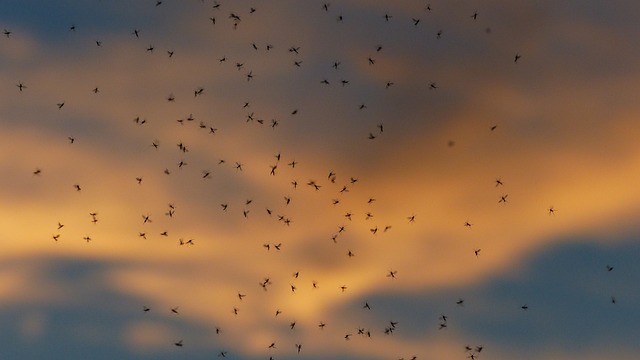Introduction
Mosquitoes can be one of the most annoying and intrusive pests of the summer months. But have you ever wondered how long these bothersome blood-suckers live? Understanding the lifespan of mosquitoes is useful for controlling the population and taking preventative measures to avoid bites and any potential illnesses they may bring. With this in mind, let’s explore the life of the mosquito.
1. Natural Life Cycle of a Mosquito
Eggs and Larvae
The life of the mosquito begins with a single egg that is laid either on the surface or in the water. The eggs hatch into larvae which then feed on microscopic organisms in the water for about two weeks.
Pupae
After two weeks, the larvae transform into pupae which are larger and swim more rapidly than the larvae. The pupae also feed on microorganisms while they complete the transformation into adults.
Adulthood
When their transformation is complete, the mosquitoes become adults and seek out warm-blooded hosts to feed on. The adult mosquitoes have an average lifespan of only two weeks; however, the female mosquitoes live significantly longer than the males.
2. Differences in Life Span
Breeding and Weather Conditions
The overall life cycle of the mosquito is largely dependent on the weather, season and availability of food. When there is plenty of food and ideal temperatures, the rate of development of the eggs and larvae accelerates, allowing the entire life cycle to be completed much faster than in harsher conditions. This is why mosquitoes may seem to be around for months when the conditions are favorable.
Environment, Species, and Lifestyle
The varying species of mosquito and their environments also affect the mosquito’s life span. Some mosquitoes prefer outdoor habitats, while other species of mosquitoes are more adapted to indoor environments. In addition, certain mosquitoes may opt to hibernate during colder months, extending their overall lifespan.
3. How to Reduce the Population
Removal of Weather Conditions
The best way to prevent mosquitoes from taking up residence in your home is to remove conditions they need to survive. Mosquitoes need moisture, so it is important to keep basements, attics, and other areas of the home dry. It is also important to maintain screens on windows and doors to keep mosquitoes from infiltrating the home.
Avoid Standing Water
Mosquitoes lay their eggs in standing water, so make sure to empty birdbaths, wading pools and other contains in which water collects. Keeping the grass and other plants trimmed will also help get rid of potential breeding habitats.
Sprays and Traps
In addition to these preventative measures, using sprays and traps can help reduce the number of mosquitoes in your area. Insecticides, candles, and mosquito traps can be used to reduce mosquitoes in the home.
4. Disease Carried by Mosquitoes
West Nile Virus
One of the more known diseases carried by mosquitoes is the West Nile Virus. The virus is spread when an infected mosquito bites a human, animal or bird. Symptoms of the virus can include fever, headache, body aches, swollen lymph glands and in rare instances, paralysis and death.
Zika Virus
Another well-known virus spread by mosquitoes is the Zika virus. This virus can cause mild symptoms such as fatigue and rash, but in pregnant women it has been linked to a birth defect called Microcephaly.
Yellow Fever
Another mosquito-borne illness is Yellow fever. The virus is spread mainly in tropical and subtropical parts of the world, and is characterized by fever, headache, vomiting and painful joints. In some cases, the virus can cause body bleeds, jaundice and organ failure which can be life-threatening.
People Also Ask
1. What is the Average lifespan of a Mosquito?
The average lifespan of a mosquito is about 2 weeks, but the actual lifespan can vary depending on the species, environment, and lifestyle.
2. How Long Do Male and Female Mosquitoes Live?
Male and female mosquitoes typically have different lifespans; the male mosquitoes live for around 7 days on average, while female mosquitoes average about 2-3 weeks.
3. Do Mosquitoes Have Natural Predators?
Yes, mosquitoes have natural predators, such as birds, bats, dragonflies and frogs.
4. What is the Best Way to Get Rid of Mosquitoes?
The best way to get rid of mosquitoes is to remove the conditions they need to survive, such as standing water, grass and vegetation, and moisture. Additionally, insecticides, candles, sprays and mosquito traps can be used to reduce the mosquito population in the home.
5. Can Mosquitoes Transmit Diseases?
Yes, mosquitoes can transmit diseases such as the West Nile virus, Zika virus, and Yellow fever.
Final Words
Mosquitoes are a common nuisance of warmer months, but understanding their life cycle and how to control the population can be useful for reducing bites and potential illnesses. Following preventative measures such as removing potential habitats, avoiding standing water, and using sprays and traps can help keep mosquito populations down. In addition, being aware of the diseases that mosquitoes can transmit can help keep you and your family safe.

